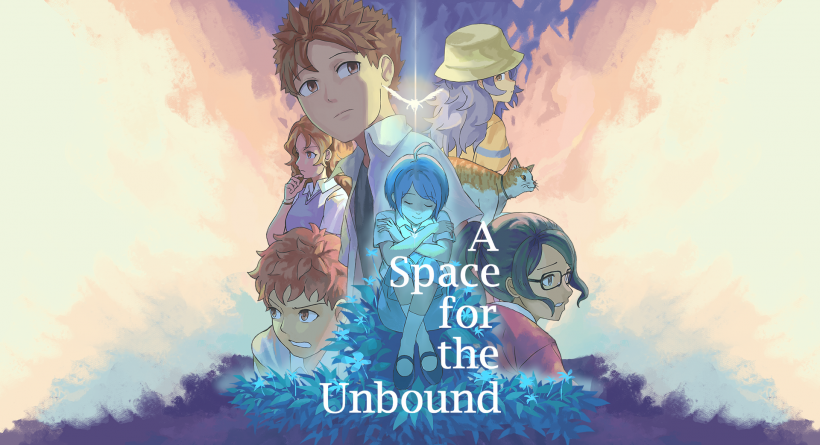What exactly does it mean to be real? What constitutes real? We tend to consider things “real” when we can directly interact with them: when we can touch, taste, or smell something that’s directly in front of us. That cinnamon bun touching your tongue, the earth pressing firmly against your back as you breathe in the smell of the freshly mown grass you’re lying upon, or the warmth of someone’s hand held tightly in your own. Most people would agree that those things are real.
However, “real” is a blurry and mutable concept that has been, and continues to be, debated by philosophers, writers, artists, filmmakers, psychologists, video game developers, and more. Humanity, it seems, has always had a somewhat tenuous grasp on our existence; the idea that our entire lives might only exist inside the mind of someone else, or the thought that perhaps we are all inside of a computer-generated program like the Matrix, these thoughts permeate into the collective consciousness and likely keep many-a-budding-philosopher up at night.
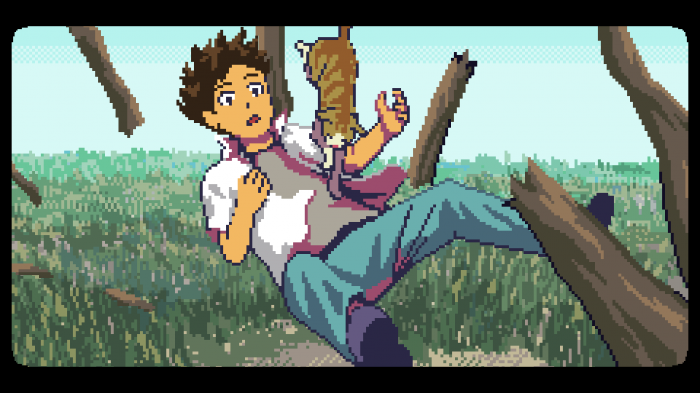
The line gets even blurrier when we begin to delve into our own minds and memories. That time you fell off your bike as a kid and cut yourself: that was so real that you have the scars to prove it. But how is that memory any more or less real than the memory you have of the characters from your favourite book overcoming injury and hardship? Both memories can be just as vivid and feel just as real. Perhaps you’ll never be able to physically meet those characters at your local bus stop, but does that mean you don’t know them? What makes one memory more “real” than the other?
Whilst we ruminate on those thoughts and ideas, consider this: when a video game can make the reviewer wax philosophical for three full paragraphs on what it means to be real before getting down to business, then you know you’re in for a fantastic gaming experience.
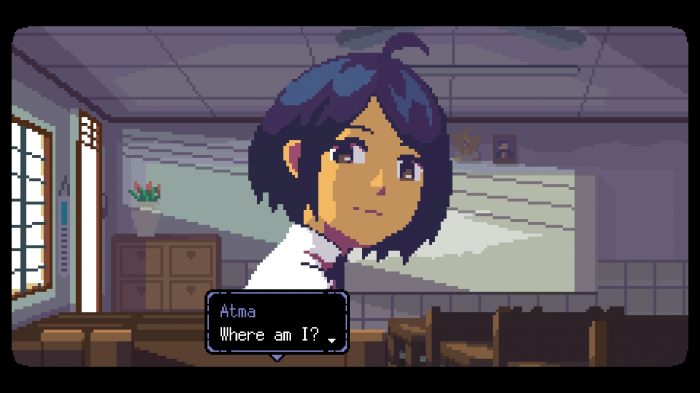
A Space for the Unbound comes to us from publisher Chorus Worldwide Games, and developers Mojiken Studio. It follows the story of Atma, a high school boy living in rural Indonesia in the 90’s. Atma, and his girlfriend Raya, are closing in on their high school graduation, and as such, it is time for them to start thinking about what they want to do in the future. After a stern warning from their teacher to get their future goals worksheet handed in ASAP, Atma and Raya decide instead to create their very own bucket list of things they want to do together. From watching a movie to throwing a party, Atma and Raya get to work right away on completing their bucket list. However, when people and circumstances begin to hinder their progress, Raya reveals her hidden magical powers to alter the world around her, and thus begins our – and Atma’s – journey to discover just what exactly is going on in this small town.
Featuring some absolutely stunning pixel art, A Space for the Unbound is a 2D puzzle/adventure game that will have players wandering up, down, and around the town talking to people and collecting various items to solve puzzles and gather information. From finding materials to build a cat a home, to catching a rooster in order to introduce him to the hen that’s in love with him, there are plenty of adorable and creative puzzle shenanigans that Atma will have to think his way through.
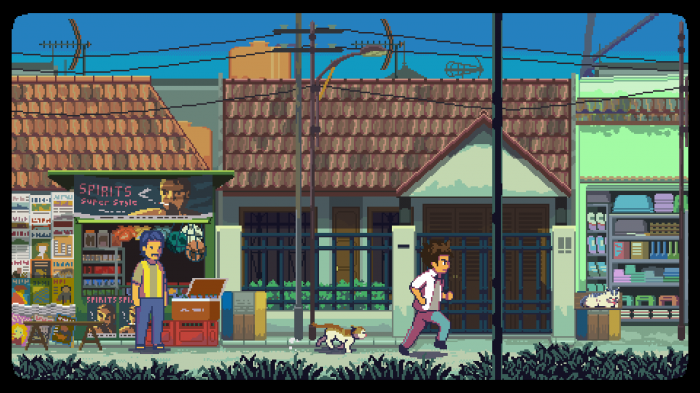
The controls are super simple and are mainly moving and interacting (A). You can run by holding B or by double tapping in the direction you want to run. As someone who owns the Switch SNES controllers, I can confirm that you can play this game with said controller; in fact, I found it more enjoyable – and easier – to use the D-pad instead of the analog stick. After about an hour of using my pro controller, I happily switched to the SNES controller and had a smoother experience simply because 2D side-scroller-style games just feel better with a D-pad. That being said, to each their own, just know that the compatibility is there for the SNES controller should players want to switch it up.
As players progress through the story, Atma will learn different ways to solve his problems. There are stealth sections, fight scenes, and even a brief stint as an attorney; there is always a new gameplay element to keep the game fresh and entertaining.
And what a story to progress through! This game will constantly keep you guessing, and asking questions like: Whose story is this? Are any of these characters even real? What does it even mean to be real? On top of that, every time you complete an item on the bucket list you are gifted a random page from the story written inside of the Magic Red Book.
The Magic Red Book is – at its most basic – your menu. By pressing X you can open the book and see your current and completed objectives, a town map, and what you’ve collected and currently have in your inventory. This intriguing book as well is the source of a special gameplay and puzzle mechanic: the Spacedive.
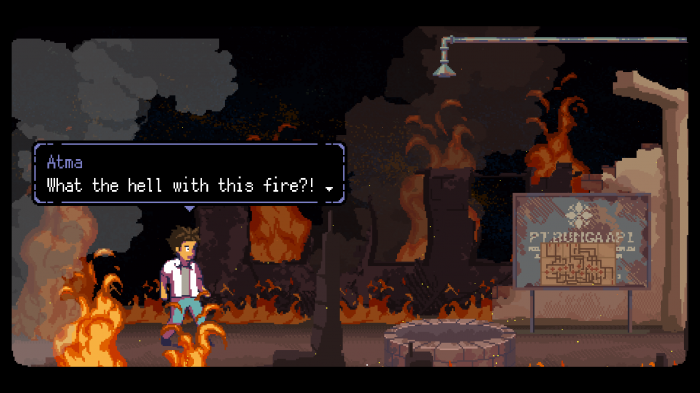
Spacediving allows Atma to enter the minds, and emotions, of distressed people to help them work through whatever mental or emotional block is causing them trouble. At first, you might assume that doing this is all for the greater good, but (and this is a testament to just how amazing, deep, and thoughtful the story in this game is) the more you Spacedive, the more you may find yourself wondering if it’s okay to dig through someone’s mind and memories and essentially alter who they are as a human being.
The moral and ethical questions posed by A Space for the Unbound are part of the truly worthwhile experience that is this game. If we as human beings, at our core, are merely a bag of meat surrounding a collection of memories and experiences… if that is what it means to BE human, then what does it mean to be someone with the power to alter those feelings, experiences, and memories? Is Atma merely helping people work through their emotions, or is he subtly altering who someone is at their core?
One of the best parts of a well-told story is that it doesn’t have all those answers. Instead, it merely poses the questions and lets the players attempt to figure out the answers for themselves. On top of those very deep-thinking, emotional, and moral questions, there is a mysterious story that will constantly keep players wondering what exactly is going on. Not until the very end do we really find out whose story is truly being told, and even then that can be up for interpretation by each individual who plays this game.
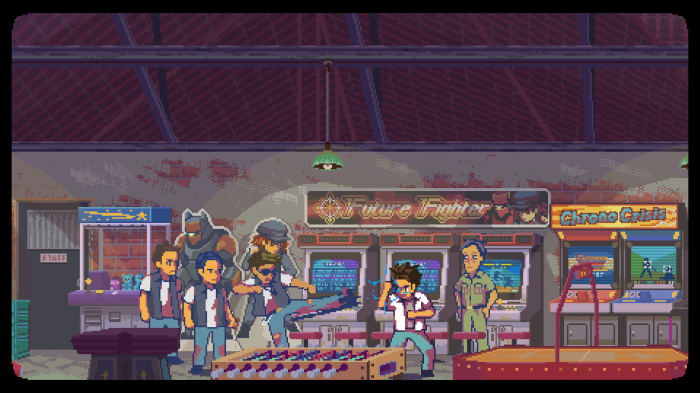
As well as the remarkable story, engaging characters, and puzzle-prowess, is a musical score that is a joy to behold. Soft piano medleys set the mood and tone of each area and chapter. Tense stealth sections and engaging action scenes are given an exciting edge, all followed by soothing and heartfelt tones that will make you cry. It is a joy to listen to every moment of this game.
A Space for the Unbound is truly a game you do not want to miss. Brilliant storytelling that will hit you hard in your emotions, while at the same time posing all kinds of questions about the nature of those emotions, reality, and what makes us human. Combine all of that with interweaving stories, beautiful pixel art, and fantastic music, and you have an experience that is definitely worth your time and money.
A Space for the Unbound £17.99
Summary
A Space for the Unbound is an incredibly touching story that will keep you guessing until the very end. With beautiful pixel art and a fantastic soundtrack, this is a game you don’t want to miss.

